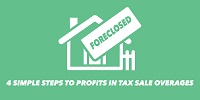All Categories
Featured
Table of Contents
Many of those house owners really did not also know what excess were or that they were even owed any kind of excess funds at all. When a home owner is unable to pay residential or commercial property taxes on their home, they may shed their home in what is recognized as a tax sale public auction or a sheriff's sale.
At a tax sale auction, residential properties are offered to the highest possible prospective buyer, nonetheless, in some cases, a home might market for greater than what was owed to the area, which leads to what are known as surplus funds or tax obligation sale excess. Tax obligation sale excess are the money left over when a foreclosed residential or commercial property is cost a tax obligation sale auction for greater than the quantity of back tax obligations owed on the property.
If the building offers for greater than the opening quote, after that excess will be generated. What many property owners do not understand is that numerous states do not permit areas to keep this added cash for themselves. Some state laws determine that excess funds can only be asserted by a few parties - consisting of the person that owed taxes on the residential or commercial property at the time of the sale.
If the previous property owner owes $1,000.00 in back taxes, and the home sells for $100,000.00 at public auction, then the legislation mentions that the previous residential property proprietor is owed the difference of $99,000.00. The county does not reach keep unclaimed tax overages unless the funds are still not claimed after 5 years.
Sought-After Property Tax Overages Strategy Tax Overages Business
The notice will typically be mailed to the address of the residential property that was sold, yet because the previous building owner no much longer lives at that address, they commonly do not obtain this notification unless their mail was being sent. If you remain in this scenario, don't allow the government keep money that you are qualified to.

Every currently and then, I listen to speak about a "secret new opportunity" in business of (a.k.a, "excess profits," "overbids," "tax sale excess," and so on). If you're totally not familiar with this idea, I would love to offer you a fast overview of what's going on here. When a homeowner quits paying their property tax obligations, the regional community (i.e., the region) will certainly await a time before they seize the home in foreclosure and market it at their yearly tax obligation sale public auction.
uses a comparable version to redeem its lost tax profits by selling residential or commercial properties (either tax actions or tax liens) at a yearly tax obligation sale. The information in this write-up can be affected by lots of one-of-a-kind variables. Always seek advice from a professional attorney prior to doing something about it. Intend you possess a residential or commercial property worth $100,000.
Innovative Tax Sale Overages Blueprint Property Tax Overages

At the time of foreclosure, you owe ready to the region. A couple of months later on, the county brings this property to their yearly tax obligation sale. Right here, they offer your property (together with dozens of various other overdue properties) to the highest possible bidderall to redeem their lost tax earnings on each parcel.
This is because it's the minimum they will certainly need to redeem the cash that you owed them. Below's the important things: Your building is easily worth $100,000. A lot of the financiers bidding on your building are totally knowledgeable about this, as well. In a lot of cases, properties like your own will obtain bids FAR past the amount of back tax obligations actually owed.
Yet obtain this: the region only required $18,000 out of this building. The margin in between the $18,000 they needed and the $40,000 they obtained is referred to as "excess earnings" (i.e., "tax obligation sales excess," "overbid," "surplus," and so on). Several states have statutes that restrict the area from maintaining the excess settlement for these homes.
The area has policies in area where these excess profits can be declared by their rightful proprietor, generally for an assigned duration (which differs from state to state). If you shed your residential property to tax obligation repossession due to the fact that you owed taxesand if that residential property consequently sold at the tax obligation sale auction for over this amountyou could probably go and gather the distinction.
High-Value County Tax Sale Overage List Education How To Recover Tax Sale Overages
This includes proving you were the prior proprietor, completing some documentation, and waiting on the funds to be delivered. For the typical person that paid complete market value for their residential or commercial property, this method doesn't make much sense. If you have a significant amount of money spent right into a property, there's means too a lot on the line to just "let it go" on the off-chance that you can bleed some extra squander of it.
As an example, with the investing technique I make use of, I can get homes cost-free and clear for pennies on the dollar. To the shock of some financiers, these deals are Thinking you recognize where to look, it's honestly easy to locate them. When you can acquire a building for a ridiculously low-cost cost AND you recognize it deserves significantly greater than you spent for it, it might quite possibly make sense for you to "roll the dice" and attempt to collect the excess profits that the tax obligation repossession and auction procedure generate.
Elite Bob Diamond Tax Overages Blueprint Program Unclaimed Tax Overages
While it can certainly turn out comparable to the way I have actually explained it above, there are also a couple of disadvantages to the excess proceeds approach you really should certainly understand. Tax Sale Overage Recovery. While it depends substantially on the qualities of the home, it is (and in some instances, most likely) that there will certainly be no excess profits generated at the tax sale public auction
Or possibly the county does not produce much public rate of interest in their public auctions. Either method, if you're purchasing a property with the of letting it go to tax obligation repossession so you can gather your excess proceeds, what if that cash never comes with?
The initial time I pursued this strategy in my home state, I was informed that I didn't have the choice of asserting the excess funds that were created from the sale of my propertybecause my state didn't permit it (Overages List by County). In states similar to this, when they generate a tax obligation sale excess at an auction, They just keep it! If you're thinking of utilizing this method in your company, you'll wish to assume lengthy and difficult concerning where you're operating and whether their legislations and statutes will certainly also permit you to do it
Market-Leading Foreclosure Overages List Course Tax And Mortgage Overages
I did my ideal to offer the proper solution for each state above, yet I 'd suggest that you prior to proceeding with the presumption that I'm 100% proper. Bear in mind, I am not a lawyer or a certified public accountant and I am not attempting to hand out expert legal or tax advice. Speak with your lawyer or certified public accountant before you act upon this information.
Latest Posts
Investing In Real Estate Tax Liens & Deeds
Delinquent Property Tax Auction Near Me
Homes For Sale For Taxes Owed